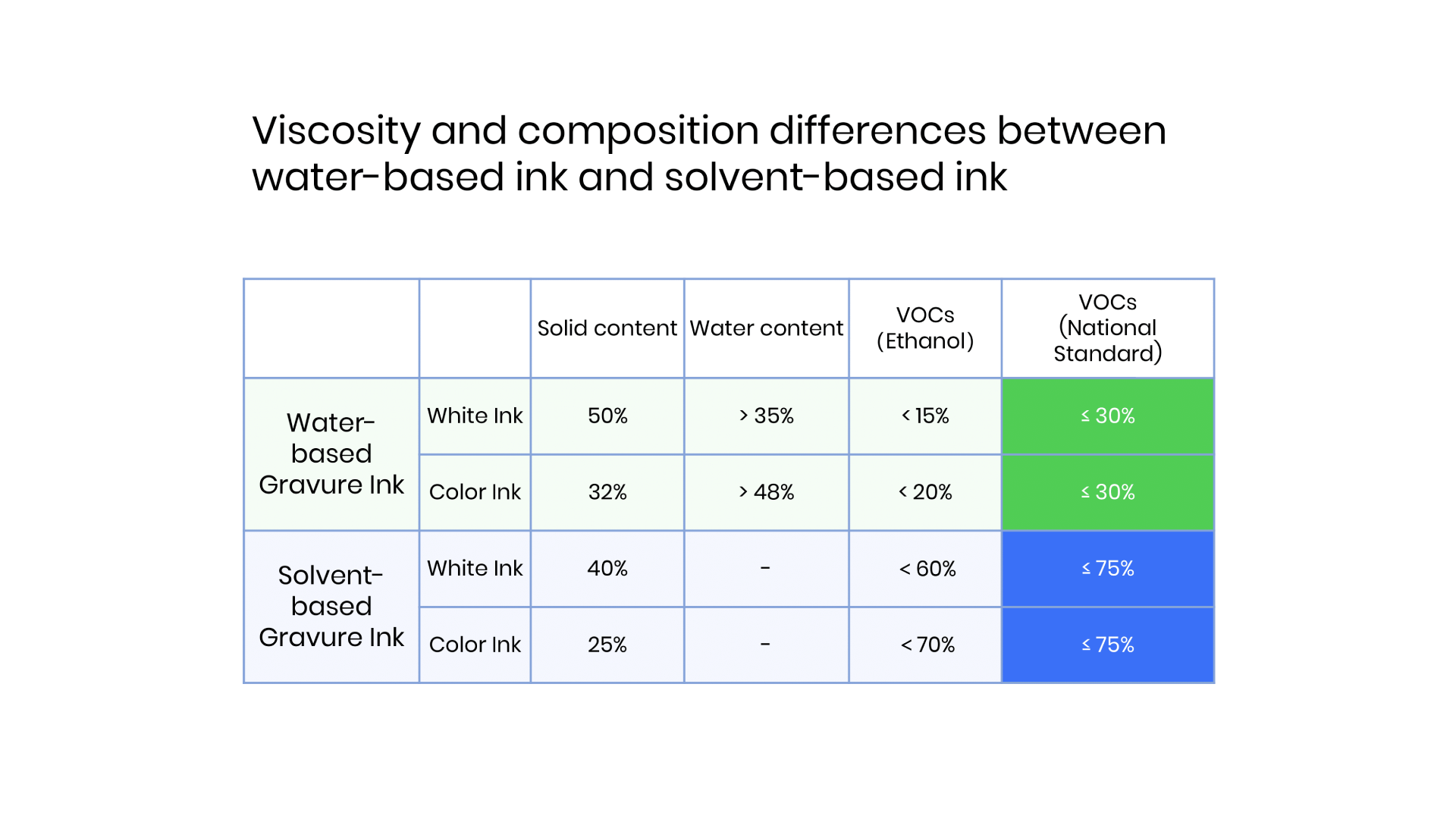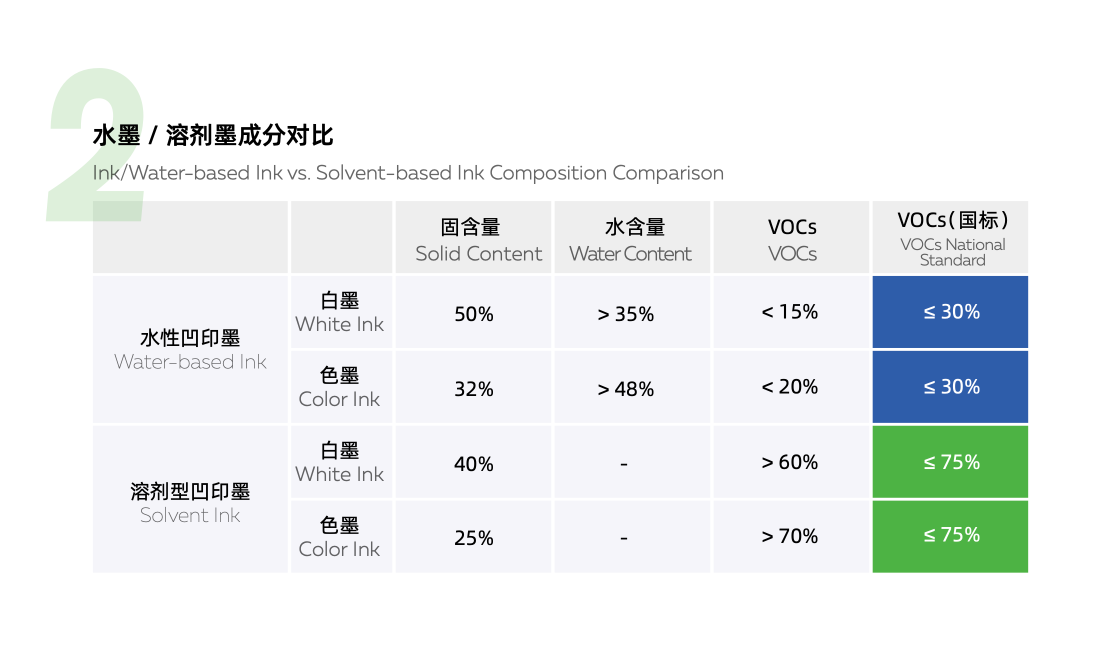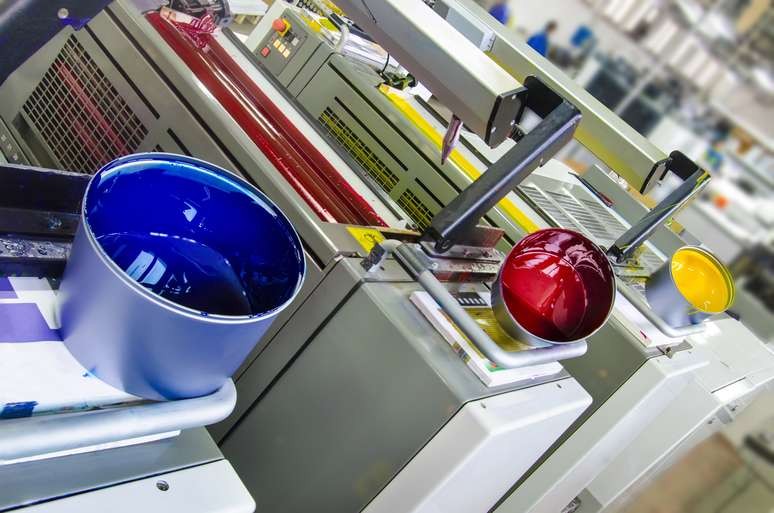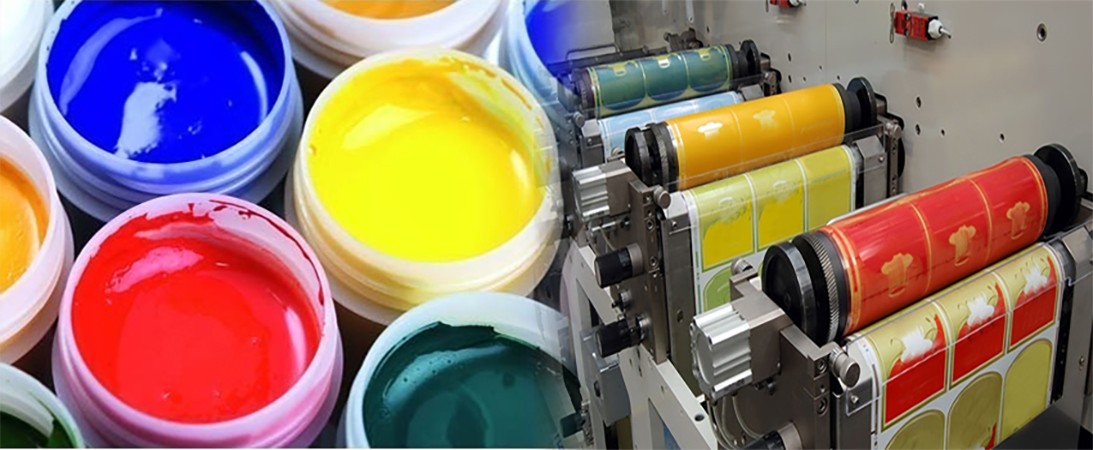Introduction

In today's eco-conscious world, the ink solvent industry is under scrutiny for its environmental impact. The use of solvent-based inks has raised concerns about air and water pollution and health risks for workers. As a result, the demand for water-based inks, such as eco solvent water-based ink, is on the rise. Leading the charge in this green printing revolution is Qinghe Chemical, a company committed to providing sustainable solutions for the packaging industry.
The Environmental Impact of Ink Solvents
Solvent-based inks have been a mainstay in printing, but their environmental impact can't be ignored. Here's why we should consider a more sustainable alternative:
- Reduced Emissions and Waste: Solvent-based inks release harmful Volatile Organic Compounds (VOCs) during production and use. Water-based inks with minimal VOCs significantly reduce these emissions and create less toxic waste.
- Protects Soil and Water: Improper disposal of solvent-based ink residue can contaminate soil and water sources. Water-based inks minimize this risk, protecting delicate ecosystems.
- Vibrant Colors, Fast Drying: Water-based inks don't compromise on quality. They produce vibrant colors and dry quickly, making them a practical choice for businesses.
By switching to water-based inks, printing companies can significantly reduce their environmental footprint without sacrificing print quality. It's a win-win for businesses and the environment.
Advantages of Water-based Inks
Water-based inks are becoming increasingly popular due to their environmental benefits. Here are some of their key advantages:
- Reduced VOC Emissions: Water-based inks contain low volatile organic compounds (VOCs), contributing to air pollution and smog. This makes them safer for indoor printing environments and reduces their overall environmental impact.
- Biodegradability: Unlike solvent-based inks, which can harm the environment if not disposed of properly, water-based inks are typically biodegradable. This means they can break down naturally by microorganisms, minimizing waste and environmental pollution.
- Non-Toxic: Water-based inks are generally considered non-toxic, making them a safer choice for use around children and food. This is especially important for applications like printing on food packaging or children's toys.
Water-based inks offer a more sustainable and eco-friendly alternative to traditional inks. Their reduced VOC emissions, biodegradability, and non-toxic properties make them a better choice for human health and the environment.
Qinghe Chemical: Leading the Green Printing Revolution
Qinghe Chemical has emerged as a pioneer in developing high-quality eco solvent inks that meet stringent environmental standards without compromising performance. Their innovative water-based eco solvent ink products are designed to provide vibrant colors and excellent adhesion while minimizing ecological footprint.
Qinghe Chemical's commitment to environmental sustainability is evident in its dedication to developing eco-solvent inks that not only meet stringent environmental standards but also deliver exceptional performance. Their innovative water-based eco solvent ink products are a testament to their focus on vibrant colors and excellent adhesion, all while minimizing the ecological footprint. By prioritizing the development of environmentally friendly printing solutions, Qinghe Chemical is leading the green printing revolution and setting a new standard for the industry.
Understanding Ink Solvents

Solvent-based inks in the ink solvent industry have raised concerns about health risks associated with prolonged exposure to toxic chemicals. Workers in printing facilities face increased respiratory issues and skin irritation risks due to the volatile organic compounds (VOCs) present in solvent-based inks.
Health Risks Associated with Solvent-based Inks
Solvent-based ink contains harmful VOCs that can lead to respiratory problems, skin irritation, and even long-term health issues for workers in the printing industry. Prolonged exposure to these toxic chemicals can have serious consequences, so companies need to prioritize the transition to safer alternatives like water-based eco solvent ink.
Environmental Impacts of Ink Solvents
The environmental impact of ink solvents is a growing concern, as VOC emissions contribute to air pollution and climate change. Additionally, solvent-based ink disposal poses a threat to water sources and ecosystems, further highlighting the need for eco-friendly alternatives such as water-based eco solvent ink.
Cost and Safety Concerns with Solvent-based Solutions
Aside from health and environmental risks, solvent-based solutions also have cost implications. The need for extensive safety measures and ventilation systems adds operational expenses, making it financially prudent for companies to consider switching to safer options like water-based eco solvent ink.
Remember that choosing the right type of ink is not just about print quality; it's also about protecting our health and environment.
The Rise of Water-based Inks

Benefits of Water-based Inks for Packaging
Water-based inks are becoming increasingly popular in the packaging industry for several reasons. Here are some key benefits they offer:
- Reduced Environmental Impact: Unlike traditional solvent-based inks, water-based inks are formulated with minimal or no harmful solvents. This significantly reduces their contribution to volatile organic compounds (VOCs), which pollute the air and cause environmental issues.
- Improved Worker Safety: Water-based inks contain fewer harsh chemicals, so they create a safer working environment for printing press operators and those handling the packaging materials.
- Vibrant Colors and Enhanced Appeal: Modern water-based inks can deliver high-quality, vivid colors that make packaged products stand out on store shelves and grab consumer attention.
- Safer for Consumers: With minimal VOC emissions, water-based inks pose a lower health risk to consumers who contact them with the packaging.
By choosing water-based inks for your packaging needs, you're not only making a sustainable choice for the environment but also contributing to a safer workplace and potentially even a healthier product for consumers.
Qinghe Chemical's Innovative Water-based Gravure Inks
Qinghe Chemical has been at the forefront of developing innovative water-based gravure inks that deliver exceptional print quality while meeting strict environmental standards. Their commitment to research and development has resulted in a range of eco-solvent water-based ink options that provide excellent adhesion, color consistency, and resistance to abrasion while minimizing their ecological footprint.
Compatibility with Flexible Food Packaging
One key advantage of water-based inks is their compatibility with flexible food packaging materials such as plastic films and paperboard. This makes them ideal for applications where food safety is paramount, as they do not pose a risk of contaminating the contents with harmful chemicals. As more brands prioritize sustainable packaging solutions, water-based eco solvent ink becomes increasingly popular for food-related products.
Comparing Performance

When it comes to print quality and durability, the debate between solvent and water-based inks is a hot topic in the ink solvent industry. While solvent-based inks are known for their vibrant colors and high durability, water-based inks have made significant advancements in recent years, offering comparable print quality and excellent durability. This shift has led to a growing demand for eco solvent water based ink that delivers performance and sustainability.
Print Quality and Durability: Solvent vs. Water-based Inks
Solvent-based inks were favored in the past for their exceptional print quality and durability, especially for outdoor applications. However, with ongoing technological advancements, water-based eco solvent ink has emerged as a formidable competitor, offering vibrant colors and excellent adhesion on various substrates. This has led to a shift towards water-based inks for applications requiring high print quality and long-lasting durability without compromising environmental impact.
Production Efficiency and Environmental Footprint
When it comes to production efficiency and environmental footprint, the choice between solvent-based and water-based inks becomes even more critical. Solvent-based inks often require additional drying time and specialized ventilation systems and pose significant health risks to workers due to volatile organic compounds (VOCs). On the other hand, eco-solvent water-based ink offers faster drying times, reduced energy consumption during printing processes, and minimal environmental impact due to lower VOC emissions.
Qinghe's Commitment to Sustainable Packaging Solutions
As an industry leader committed to sustainable packaging solutions, Qinghe Chemical has been at the forefront of developing innovative eco-solvent water-based ink that meets the highest performance standards while minimizing environmental impact. By investing in research and development of water-based gravure inks that deliver exceptional print quality, durability, and compatibility with flexible food packaging materials, Qinghe is paving the way for a greener future in the printing industry.
Regulatory Landscape
In the ink solvent industry, regulations and compliance are crucial to ensuring the safety of workers and the environment. With increasing awareness of solvent-based inks' health risks and environmental impacts, regulatory bodies are tightening their standards to promote safer alternatives. This has led to a growing demand for eco solvent ink solutions that meet stringent regulatory requirements.
Regulations and Compliance for Ink Solvents
Regulatory bodies such as the Environmental Protection Agency (EPA) and Occupational Safety and Health Administration (OSHA) have set strict guidelines for using ink solvents in printing processes. These regulations aim to minimize air and water pollution and protect workers from exposure to harmful chemicals found in solvent-based inks. As a result, many companies are seeking eco solvent water-based ink options that comply with these regulations while still delivering high-quality results.
Sustainable Packaging Initiatives Driving Demand for Water-based Inks
The shift towards sustainable packaging solutions has been a driving force behind the increasing demand for water-based inks. As consumers become more environmentally conscious, brands are pressured to adopt eco-friendly practices throughout their supply chain, including their printing processes. Water-based eco solvent ink offers a more sustainable alternative by reducing VOC emissions and minimizing hazardous waste generation, aligning with these sustainability initiatives.
Qinghe's Role in Shaping Industry Standards
As a leader in green printing solutions, Qinghe Chemical has been at the forefront of shaping industry standards for eco-friendly ink alternatives. By investing in research and development, Qinghe has developed best eco solvent ink formulations that not only meet regulatory requirements but also exceed performance expectations. Qinghe is setting new benchmarks for environmentally responsible printing practices through its commitment to innovation and sustainability.
Making the Switch

Transitioning to Water-based Inks: Challenges and Solutions
Switching from solvent-based to water-based inks can be a daunting task for many printing companies. The challenges include retraining staff, investing in new equipment, and ensuring compatibility with existing packaging materials. However, Qinghe Chemical offers comprehensive support and training programs to help clients navigate this transition smoothly.
While the initial investment in new equipment may seem daunting, many printing companies find that water-based inks' long-term cost savings and environmental benefits make the switch well worth it. In addition to reducing air pollution and harmful emissions, water-based inks offer improved workers' safety and a more sustainable option for packaging materials. With Qinghe Chemical's support and training programs, printing companies can confidently make the transition, knowing they have a partner to guide them every step.
Case Studies: Successful Implementation of Water-based Solutions
Several printing companies have successfully implemented water-based inks with remarkable results. Not only have they reduced their environmental footprint, but they have also seen improved print quality and durability. Qinghe Chemical aims to inspire others to embrace sustainable printing practices by sharing these success stories.
Furthermore, these printing companies have reported cost savings due to reduced ink usage and waste disposal. This has not only had a positive impact on their bottom line but has also strengthened their position as an environmentally responsible business. These companies' success in implementing water-based inks demonstrates that sustainable practices can go hand in hand with business growth and success.
Qinghe's Support for Clients in Adopting Sustainable Printing Practices
Qinghe Chemical is committed to supporting its clients every step of the way as they adopt sustainable printing practices. From providing technical assistance to offering eco-friendly ink solutions, Qinghe is dedicated to helping its clients make a seamless transition towards a greener future.
In addition to technical assistance and eco-friendly ink solutions, Qinghe Chemical offers comprehensive training programs for clients looking to implement sustainable printing practices. Our team of experts provides hands-on training and guidance to ensure our clients understand the best practices for reducing waste, conserving resources, and minimizing environmental impact. By empowering our clients with the knowledge and skills they need, we are confident in their ability to contribute meaningfully to a more sustainable future.
Embrace Water-based Inks for a Greener Tomorrow

When choosing the right ink for a sustainable future, water-based inks are the way to go. With their minimal environmental impact and health benefits, they are a no-brainer for eco-conscious businesses. Qinghe Chemical's vision for environmentally friendly packaging is revolutionizing the ink solvent industry, offering the best eco solvent ink solutions for a greener tomorrow.
Choosing the Right Ink for a Sustainable Future
As businesses prioritize sustainability, the demand for eco-solvent inks is rising. Water-based eco-solvent inks offer a compelling alternative to traditional solvent-based inks, providing excellent print quality while minimizing environmental impact. By choosing water-based inks, companies can make a tangible difference in reducing their carbon footprint and promoting sustainable practices.
With the increasing focus on sustainability, companies are also looking for ways to reduce their environmental impact on their packaging materials. Water-based eco solvent inks offer high-quality printing results and contribute to the overall goal of using more sustainable materials. By incorporating these inks into their packaging designs, businesses can demonstrate their commitment to environmentally friendly practices and appeal to eco-conscious consumers. This shift towards water-based inks reflects a broader movement towards more responsible and sustainable production methods across industries.
Qinghe's Vision for Environmentally Friendly Packaging
Qinghe Chemical is at the forefront of driving change in the ink solvent industry with its innovative water-based eco solvent ink solutions. Their commitment to developing high-quality, eco-friendly products reflects their vision for environmentally friendly packaging. By prioritizing sustainability and investing in research and development, Qinghe is leading towards a more sustainable future for packaging materials.
By embracing water-based inks, businesses can take an active role in promoting sustainability within their industries. Water-based eco solvent inks offer waterproof properties and exceptional performance, making them ideal for various applications, including flexible food packaging. By switching to water-based inks, companies can contribute to creating a greener tomorrow while maintaining high-quality printing standards.

